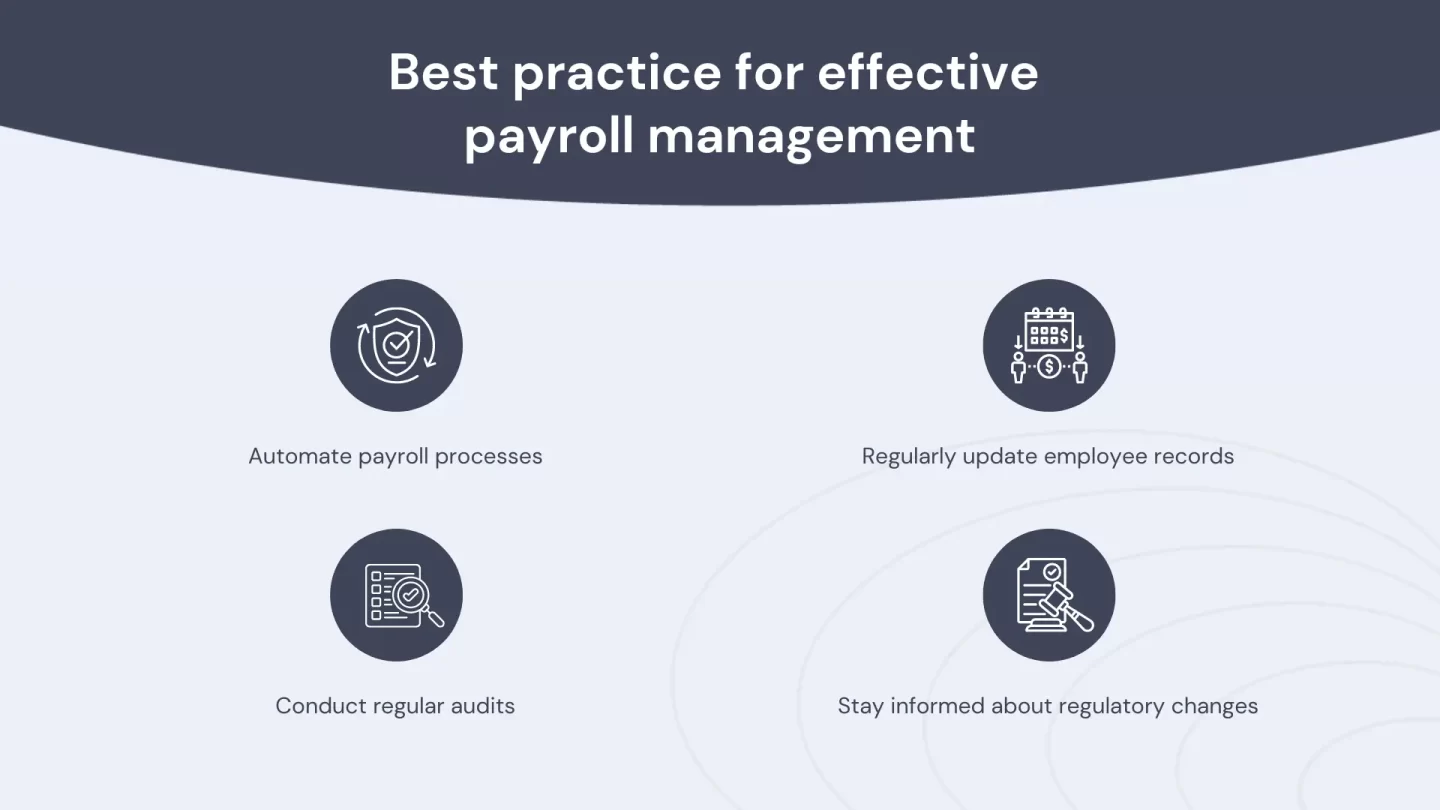Understanding Payroll Management
Payroll management refers to the administration of employees’ financial records, including salaries, bonuses, deductions, and net pay. It is a crucial function within any organization, ensuring employees are paid accurately and on time while maintaining compliance with various regulations.

The Importance of Payroll Management
Effective payroll management is essential for maintaining employee satisfaction and trust. It also helps businesses comply with tax laws and avoid penalties. Proper payroll processing ensures that all employees receive their due compensation without errors or delays.
Components of Payroll Management
Employee Information
Personal details, job titles, salary rates, and employment dates.
Earnings
Regular wages, overtime, bonuses, and commissions.
Deductions
Taxes, social security, retirement contributions, and health insurance premiums.
Net Pay
The amount employees receive after all deductions.
Each component of payroll management is integral to ensuring accurate and lawful payroll processing. Keeping precise and up-to-date employee information helps in correctly calculating earnings and deductions, which ultimately affects the net pay an employee receives.
Payroll Processing
Payroll processing involves calculating and distributing employees’ paychecks. This process includes collecting and verifying timesheets, calculating gross wages, applying deductions, and issuing payments. Efficient payroll processing is vital to ensuring that employees are paid correctly and on schedule.
Steps in Payroll Processing
Collect Employee Information
Gather necessary data such as hours worked, overtime, and any additional earnings or deductions.
Calculate Gross Pay
Determine total earnings before deductions.
Apply Deductions
Subtract taxes, insurance, retirement contributions, and other withholdings.
Calculate net pay
Determine the final amount to be paid to employees
Distribute Payments
Issue paychecks or direct deposits to employees’ bank accounts.
Maintain records
Keep detailed records of all payroll transactions for compliance and auditing purposes.
Common Payroll Deductions
- Federal and State Taxes: Mandatory withholdings based on employees’ earnings.
- Social Security and Medicare: Contributions to federal programs.
- Retirement Plans: Deductions for 401(k) or other retirement savings plans.
- Health Insurance: Premiums for employee health benefits.
Payroll Services
Payroll services are provided by third-party companies that handle payroll processing on behalf of businesses. These services offer various solutions to streamline payroll operations and ensure compliance with regulations.
Benefits of Using Payroll Services
- Accuracy: Professional payroll providers use advanced software to minimize errors.
- Compliance: Stay updated with changing tax laws and regulations.
- Time Savings: Free up internal resources by outsourcing payroll tasks.
- Security: Protect sensitive employee information with secure payroll systems.
Choosing a Payroll Service Provider
When selecting a payroll service provider, consider factors such as the provider’s reputation, the range of services offered, pricing, and customer support. It’s important to choose a provider that can meet your specific business needs.
Challenges in Payroll Management
Managing payroll can be complex and time-consuming, with several challenges that businesses need to address.
Compliance with Regulations
Staying compliant with federal, state, and local tax laws is crucial. This includes understanding tax rates, filing deadlines, and reporting requirements. Failure to comply can result in penalties and legal issues.
Handling Payroll for Remote Workers
With the rise of remote work, businesses must navigate varying tax laws and regulations across different jurisdictions. This can complicate payroll processing and compliance efforts.
Ensuring Data Security
Payroll data includes sensitive employee information that must be protected. Implementing robust security measures is essential to prevent data breaches and ensure confidentiality.
Managing Payroll for Global Employees
For businesses with international employees, managing payroll becomes even more complex. Different countries have unique tax laws, employment regulations, and payroll processing requirements that must be adhered to.
Best Practices for Effective Payroll Management
To streamline payroll operations and minimize errors, businesses should follow these best practices.

Automate Payroll Processes
Utilize payroll software to automate calculations, deductions, and payments. This reduces the likelihood of errors and saves time.
Regularly Update Employee Records
Keep employee information up-to-date, including changes in salary, deductions, and contact details. Accurate records ensure correct payroll processing.
Conduct Regular Audits
Perform periodic audits of payroll records to identify and rectify any discrepancies. This helps maintain accuracy and compliance.
Stay Informed About Regulatory Changes
Keep abreast of changes in tax laws and employment regulations. Ensure your payroll processes are updated to reflect these changes.
The Future of Payroll Management
Advancements in technology are shaping the future of payroll management, offering new solutions to enhance efficiency and accuracy.
Integration with HR Systems
Payroll systems are increasingly integrated with human resources (HR) systems, providing a unified platform for managing employee data, benefits, and payroll.
Use of Artificial Intelligence (AI)
AI-powered payroll solutions can automate complex calculations, identify errors, and provide insights into payroll trends. This enhances decision-making and reduces administrative burdens.
Cloud-Based Payroll Solutions
Cloud-based payroll systems offer flexibility, scalability, and accessibility. Businesses can manage payroll operations from anywhere, ensuring continuity and efficiency.
Enhanced Data Analytics
Advanced data analytics tools can provide valuable insights into payroll metrics, helping businesses optimize their payroll processes and make informed decisions.
Conclusion
Effective payroll management is crucial for any organization, ensuring accurate and timely payment of employees while maintaining compliance with regulations. By understanding the components, benefits, and challenges of payroll processing, and implementing best practices, businesses can streamline their payroll operations and focus on their core activities.






